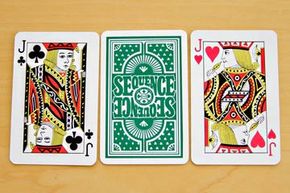Sequence Rules and Tips
Fans like Sequence because the rules are easy to understand, but the gameplay can be complex. This is especially attractive to people who don't want to spend hours reading a rule manual, but who do want to embark on a challenging quest to beat an opponent. Sequence is recommended for ages 7 and older, which makes it a game that both children and grandparents can play (as well as other generations in between). Plus, it won't take all day to finish; a typical game only takes about 30 minutes.
After you've mastered the basic concept of Sequence, there are few additional rules you'll need to learn -- dead card, loss of card and table talk:
Advertisement
- Dead card: If you run through the draw deck during play, shuffle all the discard piles together to create a new draw deck. After you've done so, you may encounter a dead card. This occurs when you hold a card that can't be played on the board. For example, the cards in your hand include an eight of hearts, but when you look for the corresponding spaces on the board, you realize they're both already occupied by another player's chips. You now have a dead card, which you can announce as such and discard at the beginning of your turn. This allows you to draw a replacement card and play your turn as usual.
- Loss of card: After you place a chip on the board and discard a card, you're supposed to draw a new card from the deck. If you forget to do so before the next player completes his turn, then you'll forfeit the right to draw a card. You'll have the distinct disadvantage of playing each turn with fewer cards than your opponents -- for the remainder of the game. It pays to pay attention!
- Table talk: If your teammate hasn't noticed a potential sequence and begins to place his chip in the wrong space, mum's the word. If you utter advice (or give a pointed cough or even gesticulate wildly), every member of your team will have to place a card in the discard pile -- and play the rest of the game using a short deck [source: Jax Ltd]. This rule may sound harsh, but it adds emotional tension to the game -- and ensures that each player will rely on her own wits and learn from her mistakes.
